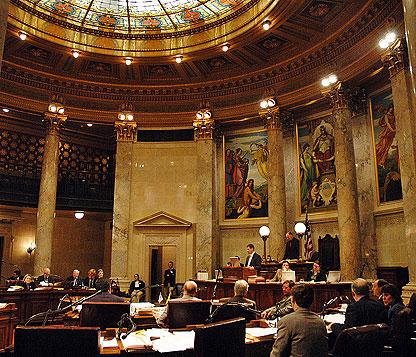The Wisconsin Senate Committee on Natural Resources and Energy held a public hearing Tuesday Jan. 31 to hear from invited speakers on per- and polyfluoroalkyl substances, also known as PFAS.
The hearing was open to invited speakers only and included a number of experts who deal with contamination cleanup, according to Spectrum News 1.
PFAS are chemicals used in products which repel grease, water, oil and foods, according to the Centers for Disease Control and Prevention. These chemicals are shown to have a potential link to harmful effects in people and animals. These chemicals also do not degrade in a natural environment, making them extremely difficult to clean up, according to the CDC.
In recent years, the government has shown a larger interest in restricting these chemicals with the Environmental Protection Agency proposing that PFAS be added to the Comprehensive Environmental Response, Compensation and Liability Act, which would allow for federal funding in cleaning up these chemicals and keeping them out of the environment.
At the state level, Gov. Tony Evers proposed more than $100 million for combating PFAS contamination in Wisconsin waters. Evers cited a three-pronged approach to addressing PFAS levels in the state, including increasing PFAS testing and monitoring, improving resources for when PFAS contamination occurs and increasing awareness about the dangers of PFAS. Evers has also previously proposed $10 million to remove these chemicals and others from private wells.
In 2022, Evers and Attorney General Josh Kaul filed a lawsuit against 18 companies which produce PFAS, and the Wisconsin Department of Justice filed a lawsuit against Tyco Fire Products and their parent organization Johnson Controls International.
University of Wisconsin professor Steph Tai, who specializes in environmental law, said that most programs at the state level are mostly involved in monitoring and treating PFAS.
If the EPA adds PFAS to CERCLA, Evers will also most likely declare Wisconsin zones as hazardous, so the government can receive funding to clean up those sites, according to Tai. The governor does not need legislative approval to mark sites as hazardous, Tai said.
At the city level, Mayor Satya Rhodes-Conway has previously spoken about PFAS in Madison waters. The city of Madison passed a resolution last year creating the first municipal PFAS treatment plant in Wisconsin. There is also a plan in place in Madison to notify people who drink from a specific well if the PFAS levels in the water increase above the recommended amount, Tai said.
Madison wells are tested annually for PFAS at the Wisconsin State Lab of Hygiene. The limit for safe drinking water set by the Wisconsin Department of Natural Resources is 70 parts per trillion of PFOA and PFOS — two types of PFAs. As of 2022, 10 of the 18 wells tested in Madison did not contain any of the 18 types of PFAS tested.
More information regarding PFAS to come on Feb. 15 during Gov. Evers biennial budget address.


